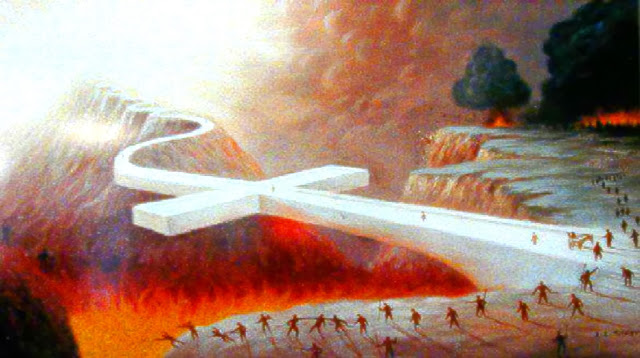The emperor of Rome, Caesar Augustus, required everyone to participate in a census. Each person had to go to their ancestral city. (The purpose of a census like this was to be sure that everyone was appropriately taxed and everyone knew who was in charge.)
 Joseph had to participate in the census just like everyone else. Because he was a descendant of King David, his ancestral city was Bethlehem. Mary, who was late in her pregnancy, accompanied him. While in Bethlehem, she went into labor and gave birth to a son, Jesus. She wrapped the baby in a cloth, and laid him in a feeding trough, because the inn had no room for them.
Joseph had to participate in the census just like everyone else. Because he was a descendant of King David, his ancestral city was Bethlehem. Mary, who was late in her pregnancy, accompanied him. While in Bethlehem, she went into labor and gave birth to a son, Jesus. She wrapped the baby in a cloth, and laid him in a feeding trough, because the inn had no room for them.Outside of Bethlehem, a group of shepherds were guarding their livestock. Suddenly an angel stood before them, and they were terrified. "Don’t be afraid!" said the angel, "I bring good news, news of great joy, news that will affect all people everywhere." Then, the angel was joined by a heavenly choir, singing praises to God.
The shepherds rushed into town to see for themselves, and found Mary and Joseph and the baby lying in the manger. Knowing this was the beginning of the prophecy, they spread the story of what they had seen. Everyone who heard the story was eager, for they knew its meaning... the great King had come to earth.
We often like to think of this time of year as it's depicted in the perfect, sappy, happy-ending Christmas specials we see on TV. You know what I mean... Lifetime and the Hallmark Channel have been running them non-stop since November 1st (with ABC and Fox close behind), so don't pretend you didn't get sucked into at least one.
But, as most of us know, it's not always a perfect world. In fact, Christmas can be a really difficult time for a lot of us... Maybe it's the first year since losing a loved one. Maybe money is really tight and we can't afford a grand meal and lots of toys for the kids. Maybe we don't have the support of our family and friends and spend the season alone.
Imagine how imperfect that first Christmas was... Mary, a very pregnant teenager, traveling over mountains to the Sea of Galilee, by foot or on a donkey, with her fiancé, Joseph. It was a week-long journey of 80 miles or so. (Here's one interpretation of what it may have been like.)
Upon arriving in Bethlehem, they're told they is no room at the inn for them, but meager accommodations are made. Imagine the smell, the noise, the utter calamity happening around them. Imagine giving birth — not in a clean hospital with doctors, nurses, epidurals, room service, and cable TV — but in a stable, alone but for her fiancé, surrounded by livestock. It was not likely a silent night, as we often romanticize it. The cries of a mother in labor. The animals agitated by their new guests. Blood and screaming, then a crying newborn baby. Most definitely not a silent night. (A video of the song, "Labor of Love" by Andrew Peterson.)
Yet, God was in the midst of all of it... the incarnation and embodiment of an almighty and powerful God.
The time of Jesus' birth was a dark time in history, stricken with greed and corruption. But with his birth came a new empire. His first visitors were not ambassadors or dignitaries. They were simple shepherds, with little to no status in the world. The revolution, then and now, is in the quiet hearts of humble, ordinary people who have made room in their lives for him.
No matter how much our lives do or do no reflect the Christmas story, God comes to every cradle — from the throne of heaven, down to the level of humanity — living among us in a broken world... seeing our pain and struggle, and meeting us where we're at.
The final theme in the Advent Conspiracy is: Love all.
It all boils down to love. Love from a savior. Love to a neighbor in need. By spending just a little less on gifts we free up our resources to love as Jesus loves by giving to those who really need help.
Go. Be. Do.
Written by Kay Weiss, guest blogger








